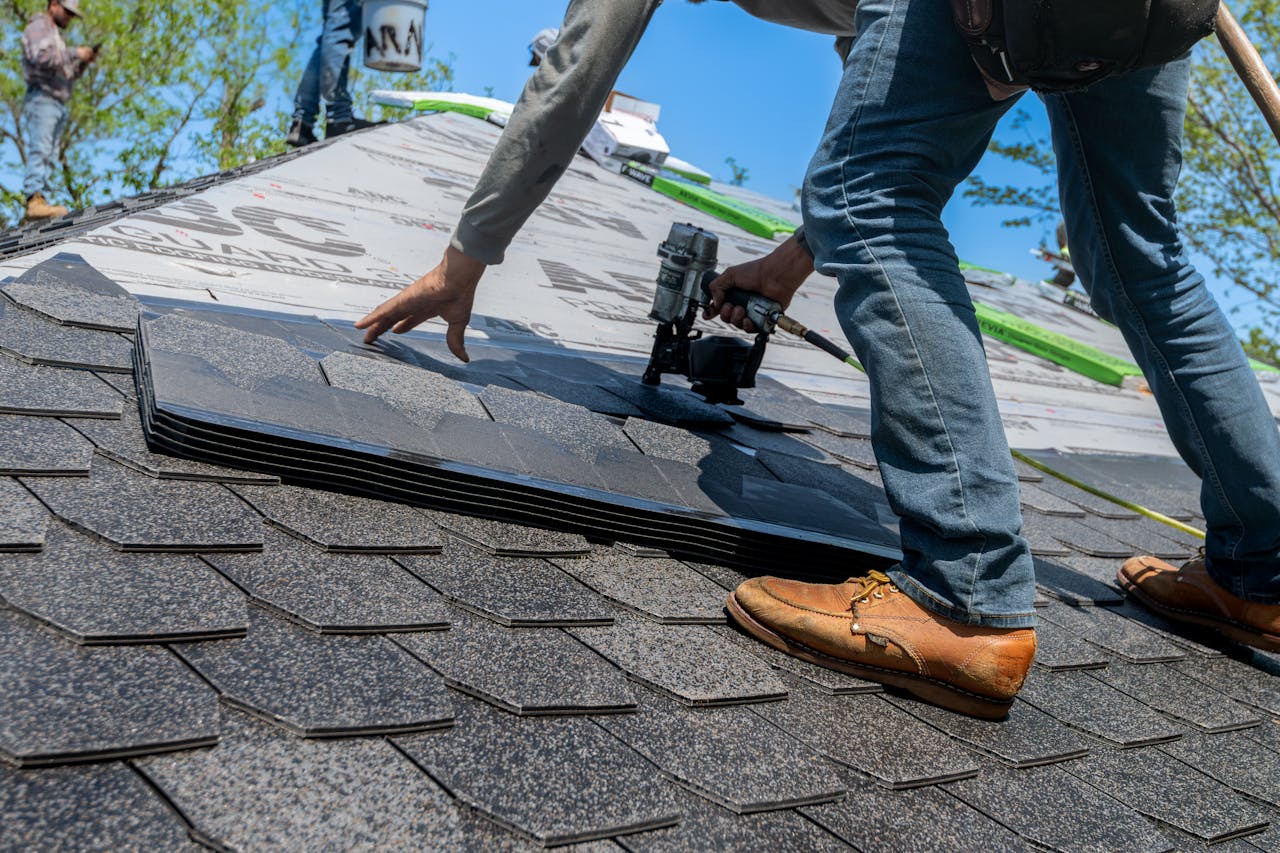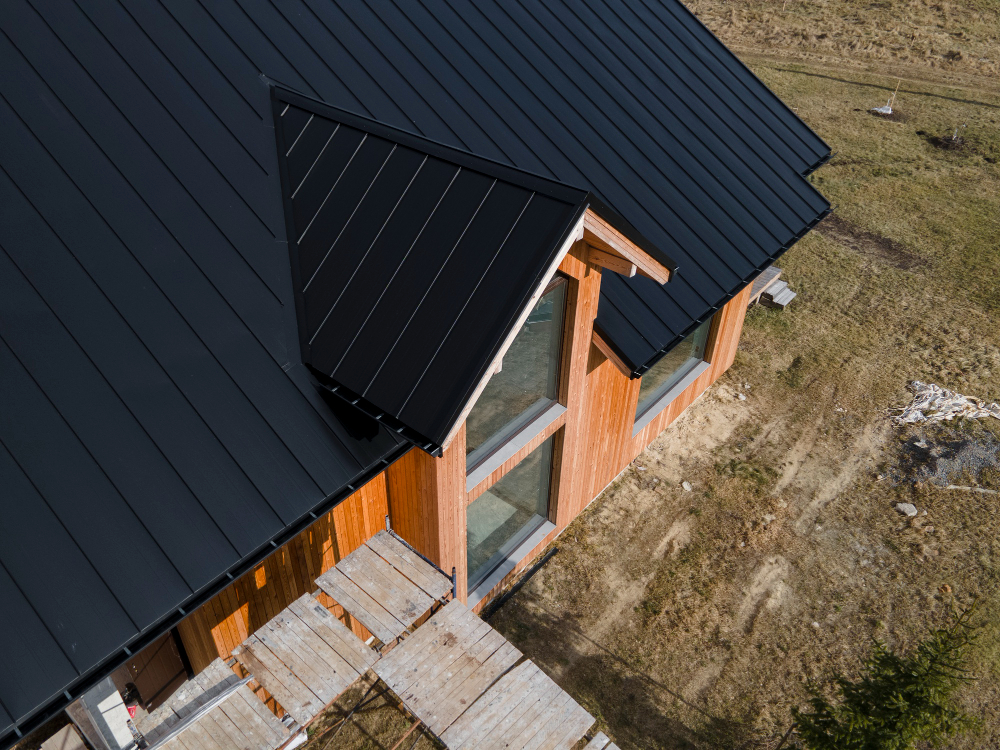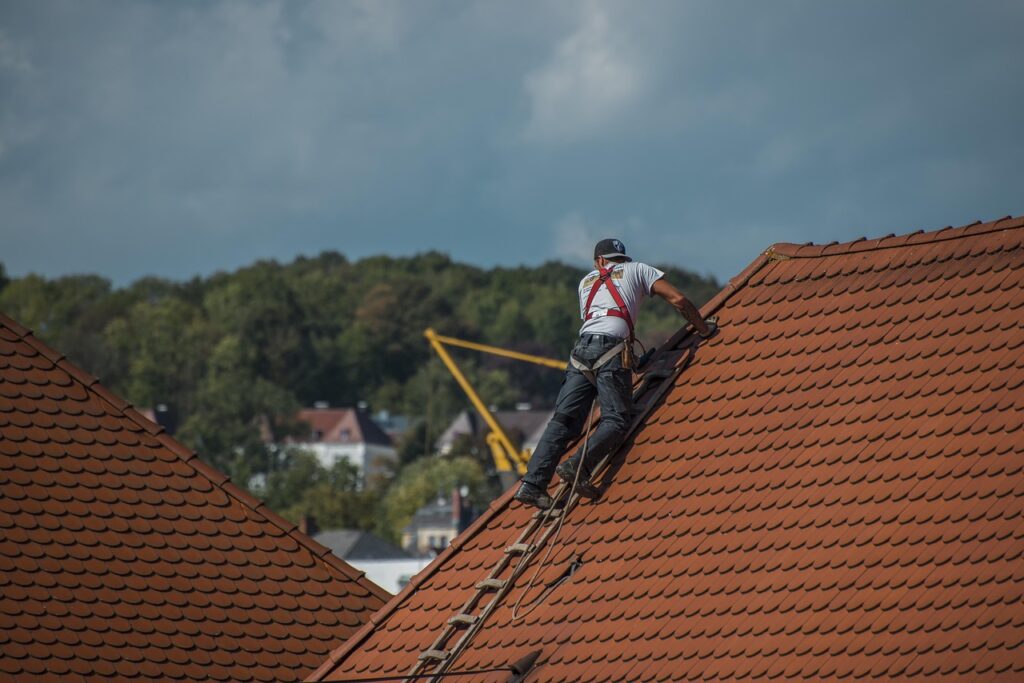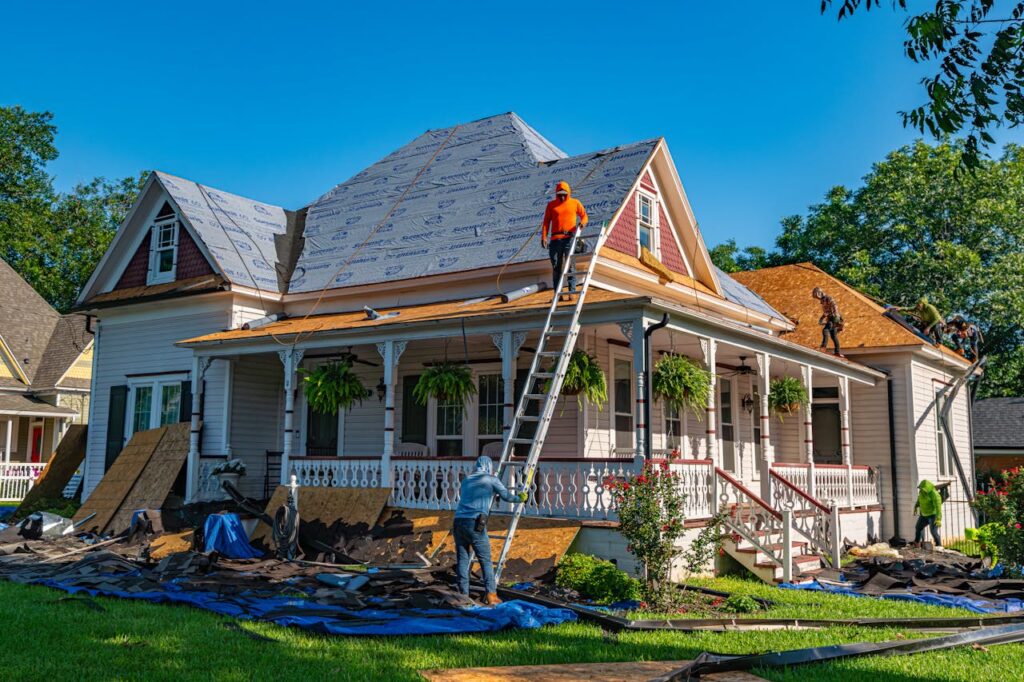
Protect your home—and your wallet—by hiring the right roofing professional who delivers quality, accountability, and long-term peace of mind.
Table of Contents
Key Takeaways
✔ Verify licensing, insurance, and certifications before hiring.
✔ Choose a local contractor with strong reviews and references.
✔ Compare multiple written estimates and contracts for clarity.
✔ Ask detailed questions about materials, warranties, and cleanup.
✔Assess their communication style—good roofers are transparent and responsive.
Choosing the right roofing contractor can make or break your investment. A well-installed roof safeguards your property’s structure, energy efficiency, and overall value. But with so many contractors promising great results, how do you separate real professionals from risky hires?
Learning how to choose a roofing contractor means knowing what to look for: verified credentials, clear communication, strong warranties, and a track record of dependable service. For homeowners and business owners in Poughkeepsie, NY, making an informed choice is the first step toward a durable, worry-free roof.
How to Choose the Best Roofing Contractor for Your Needs
When it comes to hiring a roofer, experience and transparency matter more than quick quotes or flashy ads. The best roofing contractors stand out through their professionalism, credentials, and communication.
To find the right fit, focus on five essential factors: verifying credentials, evaluating experience, reviewing estimates, comparing warranties, and assessing communication.
Each step ensures you work with a contractor who’s not just qualified—but trustworthy.
1. Verify Credentials, License, and Insurance
Before signing anything, make sure your roofing contractor is licensed and insured. A valid license ensures they meet state and local requirements, while insurance protects you from liability if something goes wrong on-site. Don’t hesitate to ask for proof—reputable contractors are happy to provide documentation.
Equally important is verifying credentials and certifications from recognized manufacturers or industry associations. These credentials reflect advanced training and adherence to quality standards. Ask about worker safety practices, too. A reliable roofer follows OSHA safety guidelines and maintains proper coverage for all crew members.
2. Evaluate the Contractor’s Experience and Reputation
Experience is the cornerstone of quality roofing work. Established roofing contractors bring years of knowledge that help prevent costly mistakes. Look for local roofers with proven success in your area—especially in regions like Poughkeepsie, where weather patterns and local codes affect roof performance.
Reputation offers another layer of trust. Read ratings and reviews on verified platforms and ask for referrals from past clients. A trustworthy contractor will gladly share references or project photos to showcase their workmanship. Be wary of those who avoid sharing verifiable proof of past work—transparency is a hallmark of professionalism.
Quick Facts: What to Check Before You Hire
- Always confirm licensing and insurance before starting a project.
- Local experience ensures familiarity with regional weather and regulations.
- Ask for at least three written estimates before deciding.
- Reliable contractors provide references and photos of completed jobs.
- A written workmanship warranty shows confidence in their work.

3. Assess Your Current Roof Before Hiring
Before you start gathering quotes, evaluate your existing roof. Look for damaged shingles, leaks, or sagging areas that may indicate deeper structural issues. Having a clear understanding of your roof’s condition helps you discuss your project knowledgeably with potential contractors. Professionals like those at Lyndsey Roofing can perform detailed inspections to determine whether repair or replacement is your best option.
4. Evaluate Estimates and Contracts Carefully
The top roofing contractors provide clear, detailed quotes—not vague one-liners. Get quotes from multiple roofers and compare them side by side. A professional estimate should break down costs for materials, labor, and cleanup while outlining the expected timeline. Don’t automatically go with the lowest bid; value and quality should guide your decision.
Before agreeing to any work, create a written contract that defines every part of the project. The scope of the roofing project—from tear-off to disposal—should be clearly detailed. Confirm that the contractor includes cleanup responsibilities and ensures your property is left in spotless condition after completion.
5. Discuss Warranties and Roofing Materials
Warranties and materials reveal a lot about a contractor’s credibility. Ask about both manufacturer warranties (covering the roofing materials) and workmanship warranties (covering installation). Reputable companies stand by their work and fix issues if they arise post-installation.
When it comes to the selection of roofing materials, quality matters. Discuss which materials best fit your home’s needs—whether asphalt shingles, metal, or slate—and ensure they suit Poughkeepsie’s climate. Experienced contractors will guide you toward energy-efficient and long-lasting options while explaining maintenance requirements upfront.
6. Assess Communication and Professionalism
Clear communication builds trust. Pay attention to how your contractor interacts with you from the first inquiry. Are they responsive? Do they explain timelines and processes clearly? Do they put everything in writing? These small signals reflect how they’ll manage your project.
Ask if the contractor offers emergency roofing services for storm damage or urgent repairs. A dependable roofer provides ongoing support beyond installation. Professionalism also extends to follow-through—timely updates, transparent scheduling, and accountability for results.
How to Tell a Good Roofer from a Bad One
A good roofer is defined by trust, not talk. They’re licensed, insured, and experienced, with a consistent record of quality work and positive client reviews. They provide written estimates, detailed contracts, and strong warranties.
By contrast, unreliable roofers tend to be vague about pricing, push for quick commitments, or lack a local address. Avoid anyone who won’t show proof of insurance or dodges questions about materials and safety. If something feels off, trust your instincts—reputation and credibility are nonnegotiable when protecting your home.
5 Best Roofing Materials for the NYC Climate
Choosing the right roofing material is just as important as choosing the right contractor—especially in a region like New York, where the weather can be unpredictable and demanding.
The NYC climate brings cold winters, humid summers, heavy rain, and occasional snowstorms, so your roof needs to stand up to extreme conditions while maintaining energy efficiency and durability.
Here are the best materials to consider for both residential and commercial roofing in the region:
1. Asphalt Shingles – Affordable and Reliable
Asphalt shingles remain one of the most popular roofing materials for NYC homeowners. They’re affordable, easy to install, and available in various colors and styles. High-quality architectural shingles can resist strong winds, handle freeze-thaw cycles, and provide reliable waterproofing for years. They also perform well with proper ventilation and underlayment, making them ideal for homes in Poughkeepsie and surrounding areas.
2. Metal Roofing – Durable and Energy-Efficient
Metal roofing is increasingly popular due to its longevity and sustainability. Steel or aluminum roofs can last 40–70 years with minimal maintenance. They reflect heat in summer, reduce cooling costs, and shed snow efficiently in winter. Metal is also highly resistant to rain and wind damage—an excellent option for both urban and suburban properties seeking long-term value.
3. EPDM and TPO Membranes – Ideal for Flat Roofs
For commercial or multi-unit buildings with flat or low-slope roofs, EPDM (rubber) and TPO (thermoplastic polyolefin) membranes are top choices. These materials provide exceptional waterproofing, UV resistance, and heat reflection—critical for reducing energy bills and protecting structures from NYC’s temperature swings. They’re also lightweight and easy to repair if damaged.
4. Slate Roofing – Timeless and Weather-Resistant
If you’re seeking a premium, long-lasting roofing option, natural slate offers unmatched durability and elegance. Slate can last over a century when properly installed and maintained. It resists moisture, fire, and temperature fluctuations, making it ideal for NYC’s four-season climate. Although more expensive upfront, it’s a lifetime investment in quality and curb appeal.
5. Modified Bitumen – Tough for Urban Flat Roofs
Another great choice for flat or low-slope roofs is modified bitumen, a layered asphalt product reinforced with fiberglass or polyester. It’s durable, waterproof, and stands up to NYC’s seasonal extremes. Many property owners prefer it for its easy maintenance and flexibility—perfect for high-traffic commercial roofs.
Choosing the Right Material for Your Roof
Selecting the best roofing material depends on your building type, budget, and long-term goals. Whether you’re drawn to the affordability of asphalt shingles or the modern efficiency of metal or TPO, partnering with an experienced roof installation contractor ensures proper installation and performance.
A trusted professional—like Lyndsey Roofing—can guide you through the options, explain warranty coverage, and recommend the best material to match your home’s architecture and the demands of the NYC climate.

Common Roofing Scams and How to Avoid Them
When it comes to roofing projects, homeowners can be vulnerable to scams—especially after storms or during busy construction seasons. Knowing how to recognize and avoid these tactics can protect you from financial loss, poor workmanship, and unnecessary stress. Here are some of the most common roofing scams and how to steer clear of them.
1. The Storm Chaser Scam
After major weather events, “storm chasers” often show up uninvited, offering quick roof repairs or replacements. They claim to have leftover materials and promise huge discounts if you sign immediately. Once paid, they either perform low-quality work or disappear altogether.
How to avoid it:
Only hire licensed local roofers with a physical address and verified reviews. Contact your insurance company directly instead of relying on a contractor who appears after a storm.
2. The Upfront Payment Trap
Some fraudulent contractors demand large deposits or full payment before any work begins. Once they have your money, they may delay, cut corners, or never return.
How to avoid it:
A reputable roofing contractor will only request a reasonable deposit—typically a small percentage to cover materials—and will never ask for full payment upfront. Always pay by check or credit card, not cash.
3. The Inflated Damage Report
Unscrupulous roofers sometimes exaggerate or fabricate roof damage to inflate insurance claims or sell unnecessary services. They may show staged photos or use vague technical jargon to pressure you into agreeing to repairs you don’t need.
How to avoid it:
Request an independent roof inspection from a trusted local contractor or a third-party inspector before approving major work. Always ask for detailed, photo-documented proof of damage.
4. The No-Contract or Vague-Contract Scam
Scammers may start work without a signed contract—or provide one that lacks details about costs, materials, and timelines. This leaves you with no recourse if something goes wrong.
How to avoid it:
Always create a written contract that clearly outlines the scope of the roofing project, payment terms, material details, warranty coverage, and cleanup responsibilities. Read it carefully before signing.
5. The Warranty Scam
Some fraudulent contractors promise a “lifetime warranty” that disappears as soon as the job is done or the company changes names. Others offer warranties that sound impressive but exclude labor or key materials.
How to avoid it:
Ask for written copies of all warranty details, including coverage terms, manufacturer backing, and workmanship guarantees. Work only with established roofing companies that are licensed and insured, with a strong local reputation for honoring warranties.
Final Tip: Trust Transparency
The easiest way to avoid roofing scams is to work with an established, transparent, and local contractor. Companies like Lyndsey Roofing have long-standing reputations, verifiable credentials, and clearly documented processes. Always trust your instincts—if something feels rushed, unclear, or “too good to be true,” it probably is.

Frequently Asked Questions | Choosing a Roofing Contractor
How can you tell a good roofer?
A good roofer is licensed, insured, experienced, and communicative, providing transparent estimates and workmanship warranties.
How do I choose a roofing contractor?
Verify their credentials, check reviews, compare estimates, and ensure they are local and insured before signing a contract.
How to choose the best roofing contractor?
Look for contractors with proven experience, clear pricing, and strong warranty coverage that demonstrates confidence in their work.
How to find the best roofer in my area?
Start with local recommendations and verified reviews. Request multiple estimates and ask for references from recent clients.
What questions should I ask before hiring a roofer?
Ask about licensing, insurance, warranty coverage, materials, safety practices, and post-project cleanup.
Work with Lyndsey Roofing — Poughkeepsie’s Trusted Roofing Experts
For homeowners and business owners in Poughkeepsie, NY, Lyndsey Roofing stands out as a reliable choice. Licensed, insured, and known for transparent service, Lyndsey Roofing delivers expert installations backed by strong warranties and exceptional communication. Their team’s local experience ensures every project meets regional standards and client expectations.
Ready to hire a roofing contractor you can count on? Contact Lyndsey Roofing today for a professional inspection, detailed estimate, and roofing solutions built to last.







